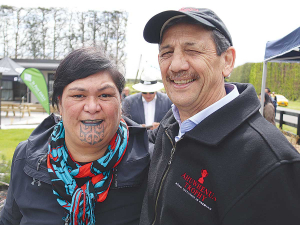Large-scale Maori hort project for Northland
The Government is sinking nearly $1 million into a major horticulture project in Northland to enhance Māori-owned land in the province.
 The boom in Maori is evidenced by the fact that last year’s Ahuwhenua Trophy awards included horticulture for the first time ever, with Maori Development Minister Nania Mahuta and awards chair Kingi Smiler among the many attending field days for the event.
The boom in Maori is evidenced by the fact that last year’s Ahuwhenua Trophy awards included horticulture for the first time ever, with Maori Development Minister Nania Mahuta and awards chair Kingi Smiler among the many attending field days for the event.
A new report estimates the gross output of Māori horticulture in New Zealand is around $220 million per year.
The report – from economic consultancy Berl and commissioned by Te Puni Kōkiri, the Ministry of Primary Industries and Horticulture New Zealand – shows growing Māori ownership in the sector. The research reveals eight times more Māori-owned businesses than previously thought. The report estimates that approximately 5% of the horticultural land in New Zealand is operated by Māori authorities, organisations and individuals, around 4000 hectares.
Around 1150 hectares are used to grow kiwifruit, the crop with the largest Māori share, followed by onion, squash, avocados and apples.
Māori own approximately 400,000 hectares of farmland, but more than half is used for sheep, beef and dairy farming and less than 1% is dedicated to horticulture.
“Our analysis looks at the extent and growth in Māori horticulture in recent years,” Berl says.
From 2006 to 2018, Māori have been increasingly investing in horticulture. “Now, with more than 4200 hectares of horticultural farms, the Māori horticulture industry has grown 300% in 12 years. This growth is expected to continue, with many iwi and Māori collectives planning expansions in kiwifruit, avocados and berries.”
According to the report, an estimated 3800 Māori work directly in the horticulture sector. This represents around 28 % of the workforce in horticulture, but they only occupy 4% of the leadership roles in the sector.
One of New Zealand’s longest-running pasture growth monitoring projects will continue, even as its long-time champion steps away after more than five decades of involvement.
The Insurance & Financial Services Ombudsmen Scheme (IFSO Scheme) is advising consumers to prepare for delays as insurers respond to a high volume of claims following this week's severe weather.
Additional reductions to costs for forest owners in the Emissions Trading Scheme Registry (ETS) have been announced by the Government.
Animal welfare is of paramount importance to New Zealand's dairy industry, with consumers increasingly interested in how food is produced, not just the quality of the final product.
Agriculture and Forestry Minister Todd McClay is encouraging farmers and growers to stay up to date with weather warnings and seek support should they need it.
The closure of SH2 Waioweka Gorge could result in significant delays and additional costs for freight customers around the Upper North Island, says Transporting New Zealand.

OPINION: If the hand-wringing, cravat and bow-tie wearing commentariat of a left-leaning persuasion had any influence on global markets, we'd…
OPINION: With Winston Peters playing politics with the PM's Indian FTA, all eyes will be on Labour who have the…